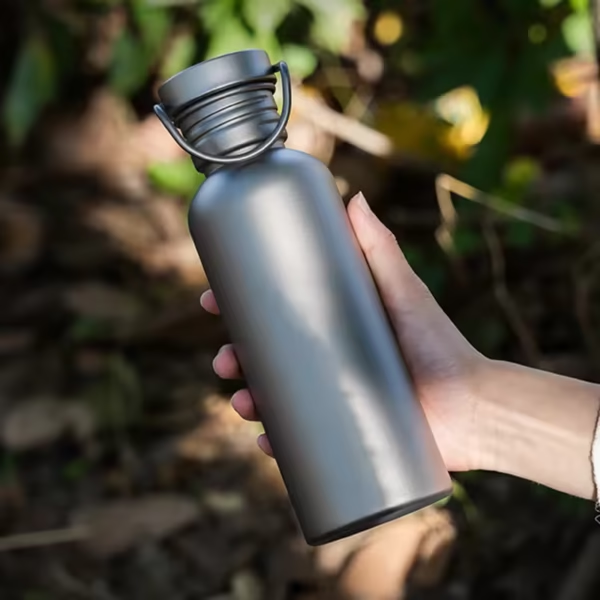Pourquoi le choix du matériau de la bouteille est plus important que vous ne le pensez
Pour les aventuriers du plein air, les utilisateurs soucieux de leur santé et les professionnels soucieux du design, la bataille entre titane et bouteilles d'eau en acier inoxydable est plus qu’esthétique : c’est une question de sécurité, de poids, de durabilité et de facilité d’utilisation à long terme.
Alors que les bouteilles en acier inoxydable dominent le courant dominant, le titane gagne rapidement en popularité pour ses performances d'élite dans les deux domaines. hydratation urbaine et conditions extrêmes.
Ce guide détaille les principales différences entre bouteille d'eau en titane et une bouteille en acier inoxydable, avec des comparaisons claires des performances et des scénarios d'utilisation réels de nos clients des secteurs du plein air, de la médecine et du sport.
Comparaison des performances de base : bouteilles en titane et en acier inoxydable
| Propriété | Bouteille d'eau en titane | Bouteille en acier inoxydable |
|---|---|---|
| Composition du matériau | ≥99,5 % de titane pur (grade 1 ou 2) | Acier inoxydable 18/8 ou 304 |
| Poids | ★ Très léger (30 à 45 % plus léger) | Plus lourd |
| Résistance à la corrosion | Excellent – même dans l'eau salée | Bon – mais sujet aux piqûres dans les chlorures |
| Rétention du goût | 100 % neutre – aucun arrière-goût métallique | Peut conserver les odeurs/saveurs au fil du temps |
| Conductivité thermique | Faible – pas idéal pour une utilisation en isolation | Modéré – bon dans les conceptions à double paroi |
| Rapport résistance/poids | Extrêmement élevé | Modéré |
| Passe au lave-vaisselle | Oui | Oui |
| Fourchette de prix (USD) | 80 $ à 150 $+ | 20 $ à 60 $ |
Toutes les valeurs sont basées sur une utilisation sur le terrain et des tests internes avec des bouteilles en titane de grade 2 et en acier SUS 304.
5 avantages clés des bouteilles d'eau en titane
1. Portabilité légère
Pour les grimpeurs, les routards et les cyclistes de longue distance, chaque gramme compte. Les bouteilles en titane sont généralement 30 à 45 % plus léger que leurs homologues en acier inoxydable au même volume.
Étude de cas : Un client de la communauté des équipements ultralégers du Colorado a réduit de 270 g le poids de l'emballage en passant d'une bouteille en acier de 1 L à notre version en titane de grade 2.
2. Pas de goût métallique ni de lessivage
Contrairement à l'acier inoxydable (qui peut laisser un arrière-goût métallique ou libérer du nickel dans des conditions acides), le titane est 100% inerte— parfait pour les utilisateurs sensibles ou ceux qui utilisent des électrolytes, des thés ou de l’eau citronnée.
3. Résistance à la corrosion inégalée
La couche d'oxyde naturel du titane fournit résistance supérieure à la corrosion, même en cas d'exposition à l'eau de mer ou à des boissons acides.
4. Compatible tir direct
Tu peux faire bouillir de l'eau directement dans des bouteilles en titane sur une flamme nue, ce qui les rend idéales pour la survie, le camping ou les scénarios d'urgence.
5. Hypoallergénique et biocompatible
Le titane est largement utilisé dans les implants médicaux pour une raison :réactivité biologique nulle. Idéal pour les utilisateurs ayant une peau sensible ou allergique aux alliages d’acier.
Notre bouteille d'eau en titane 100 % pur
-
Bouteille d'eau en titane 100% pure
Gamme de prix: $59,89 à travers $77,98 -
Cage de bouteille d'eau en titane
Le prix d'origine était: $65,58.$49,98Le prix actuel est: $49,98.
Quand l’acier inoxydable est le meilleur choix
Malgré ses limites de poids et de corrosion, l’acier inoxydable présente toujours des avantages clés :
- Une meilleure isolation: Les bouteilles en acier inoxydable à double paroi isolées sous vide retiennent mieux la chaleur/le froid grâce à une conductivité thermique modérée.
- Coût inférieur: Pour les utilisateurs qui privilégient l’abordabilité ou qui ne prévoient pas une utilisation extrême, l’acier inoxydable est une option hautement fonctionnelle.
- Plus de variantes de conception: Les bouteilles en acier inoxydable sont disponibles dans des tailles, des finitions et une disponibilité au détail plus larges.
Foire aux questions
Q1 : Le titane vaut-il vraiment son prix plus élevé ?
UN: Pour les utilisateurs qui apprécient la légèreté, la neutralité des saveurs et la polyvalence en extérieur, les bouteilles en titane offrent des performances que l'acier inoxydable ne peut égaler. Considérez cela comme un investissement dans la sécurité et l’expérience.
Q2 : Les bouteilles en titane peuvent-elles aller au lave-vaisselle ?
UN: Oui. La surface du titane est extrêmement durable et ne se dégradera pas sous les cycles normaux du lave-vaisselle.
Q3 : Quelles options de volume sont disponibles ?
UN: Les tailles courantes incluent 500 ml, 750 ml et 1 L. Nous offrons volumes personnalisés et Marque OEM pour les fabricants d'équipements de plein air.
Q4 : Y a-t-il un entretien nécessaire pour les bouteilles en titane ?
UN: Minimal. Il suffit de rincer ou de laver à l'eau tiède. Évitez les brosses abrasives pour préserver le poli de la surface.
Conclusion : quelle bouteille choisir ?
Choisir Titane Bouteille d'eau si tu:
- Besoin du le plus léger équipement possible
- Valeur aucune interférence de goût
- Vouloir ignifuge, de qualité médicale performance
- L'utilisez-vous pour une utilisation en extérieur, en voyage ou tactique
Choisir Acier inoxydable si tu:
- Préférer isolation sous vide pour boissons chaudes/froides
- Besoin d'un Prix inférieur ou option groupée
- Utilisez-le dans environnements urbains à faible risque


